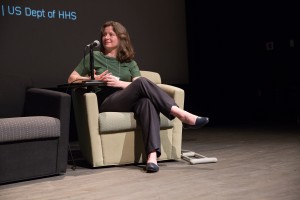Who Asks the Questions by Dawn Nafus
Erica Tanamachi
February 17, 2016
From the Quantified Self Public Health Symposium
“Literacy is a social tool, and that tool can either be used to encourage people to ask questions, or discourage them from asking anything at all.”
With this, Dawn Nafus, an anthropologist at Intel Labs who has written with great clarity about the Quantified Self movement, challenged us to think more deeply about what we mean when we call for access to data. It’s not just how we get to ask questions that’s important, but who gets to ask questions. A call for access that is focused on data flows alone will not get us to the kind of discoveries we’re after, discoveries of direct personal relevance embedded in our specific context. Dawn’s talk sparked an active discussion about the tension between aggregate data and personal data.
“If our notions of what counts as data literacy make contextual knowledge irrelevant, or not worth taking into account, then the people who do value it are never going to be the question askers — they’ll always be filtered by the concerns of others with a different kind of expertise. I’m sure you’ll agree that that’s not good enough.”



